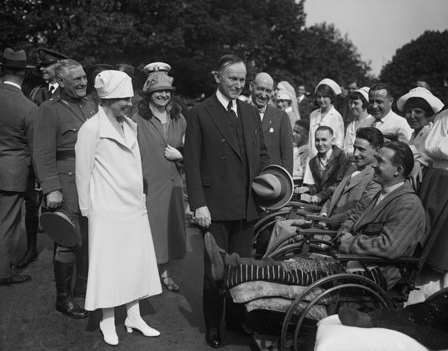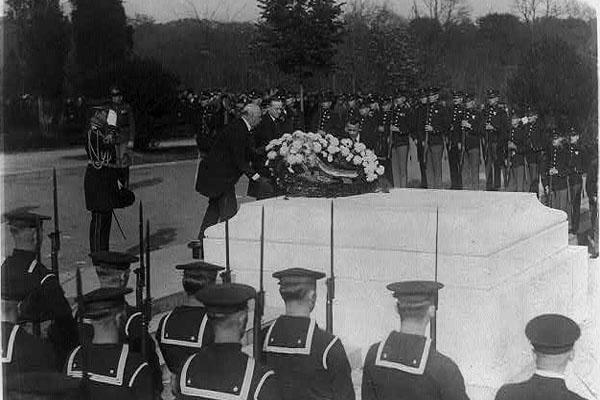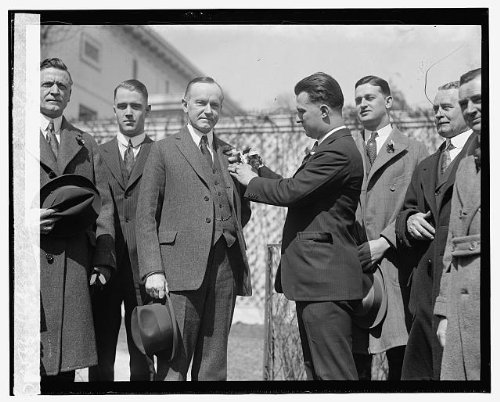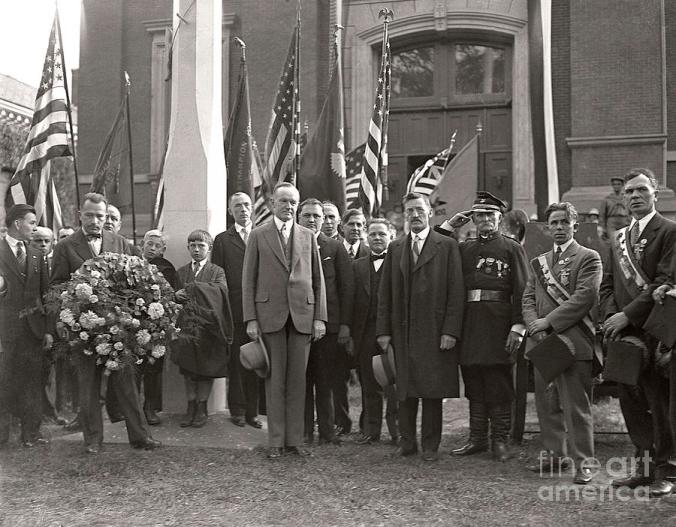
The Coolidges visiting with veterans injured in combat during World War I.
On its face, it seems terribly inconsistent that the same man who said “The nation which forgets its defenders will itself be forgotten” also opposed the bill providing cash bonuses and insurance reimbursements to the veterans of World War I. But is it? As is often required in balanced historical study, we must think deeper than the superficial surface suggests. We also, to reach accurate conclusions, must lay aside our contemporary prejudices as they often color and mislead our judgment.
The “Bonus” movement had been gaining momentum for some time. Its chief backers were members of the American Legion who disliked the term “Bonus” since it implied the promise of full payment in addition to something extra. No one was under the delusion that government had or would somehow meet anything close to full return for veteran’s services. Congressional backing was largely centered in the House, a large bloc of which was eager to secure the votes of American Legion members ahead of the mid-term elections. It had initially reached President Harding’s desk in September 1922, who would pocket veto the measure. The House easily overrode the veto but the Senate sustained the President’s stand and the matter died, at least for the moment. Another bill, generating in the Senate, sought to expand pension coverage for service in the War of 1812, the Mexican War, and the Civil War, which likewise met with Harding’s veto in January of 1923. The mid-terms were hard on the incumbent party, as they usually are, and those who did return to Congress were resolved to push the larger issue–the Bonus Bill for veterans of the Great War–again with renewed enthusiasm. With a new President–Coolidge–not yet past his first full year in office, the opportunity seemed perfect not only to test his resolve but perhaps weaken his own election chances going into the fall of 1924. It was obviously expedient for Coolidge to get on board.
It began with another try in the Senate at that expanded pension coverage extending appropriations back to the War of 1812, encompassing widows and children, and stretching into the participants of the Spanish-American War. Coolidge delivered the first of his fifty total vetoes to kill the measure on May 3, 1924. To Coolidge, it was legislation imposing hardship on the welfare of the whole people to benefit one part of it. “The desire to do justice to pensioners, however great their merit, must be attended by some solicitude to do justice to taxpayers.” Favoring a few at the burden of the whole was not justice, in Coolidge’s view.

Bestowing the wreath upon the Tomb of the Unknown Soldier, Arlington. Photo credit: Library of Congress.
The test of his resolve was not over. The Adjusted Compensation Act or more popularly known second “Soldiers’ Bonus Bill” (H. R. 7959) sailed through House and Senate and reached the President’s desk the same month. He would veto it on May 15. Knowing full well that this was more than likely to pass over his veto, and that the country would retaliate at the ballot box, he issued one of his most spirited dissents. He had already crunched the numbers appropriated by the bill and found that the program, giving out immediate cash payments to only a percentage of the qualified recipients would be coupled with 20-year endowment policies, to be paid out in 1945. Of course, ever vigilant of public funds, President Coolidge found that the whole program (with all appropriations and payouts calculated) would be deficient by $2.5 billion by the time the policies came due. This was Congressional pandering at its finest, promising money at a future time that would not be there when the time came. It would thus require an enormous fund drive, leaning heavily on the public to buy the necessary bonds to make up the deficiency. Who could know but that this would come at a far worse time for the nation? Looking ahead to 1945, he presciently warned that such a financial ordeal “may be disastrous at that time and may jeopardize the value of federal securities then outstanding.” A debt, however relatively meager, would not stay that way into the unknown future. The bill locked in a minimum of $114 million in expenditures for every annual budget on top of whatever else may happen in the future. Heralded as “free insurance” it had neither legal nor moral basis and “falls into the position of a plain gratuity.”
Coolidge, just warming up, then turns to the merits of the bill. Like President Cleveland before him, he saw military service in a much higher sense than this bill allowed. All who served in some capacity during the World War had met the first duty of every citizen to the nation. This was not directed at the disabled and dependent, Coolidge reminds Congress. Were that actually the case, the bill would find a very different situation, it would be redundant. To the disabled, care was already being expended and administered generously by more than $400 million each year. For them, “the nation stands ready to expend any amount needed for their proper care. But that is not the object of this bill.” This was a bill for those who were able-bodied, physically fit, and fully capable of providing for themselves and their families. “The gratitude of the nation to these veterans can not be expressed in dollars and cents.” There simply is no magic formula that can quantify the sacrifice given by both civilian and military service “in time of war.” Respect and honor are “theirs forever more.” These cannot be reduced to commercial goods since “patriotism can neither be bought nor sold. It is not hire and salary…To attempt to pay money for it is to offer it an unworthy indignity which cheapens, debases, and destroys it.”
He then turns the appeal made to patriotism by the bill’s backers on its head, “Those who would really honor patriotism should strive to match it with an equal courage, with an equal fidelity to the welfare of their country, and equal faith in the cause of righteousness.” It was duty not greed or material gain that had stirred the response to serve when the War came to America. Most veterans were actually insulted by the notion that a dollar amount could sufficiently reimburse services given. To add injury to insult, the bill would actually double the proportion of the nation’s debt on every home in the country (then averaging 5 persons per household: for every man, woman, and child, $70 each) and obligate its continuance over the next 20 years. The country could not maintain this bill and maintain patriotism as anything loftier than just another thing that can be exchanged like so many products in the market. Government, surrendering to the pressure to grant favor to any one party, had descended into giving away to those getting “what they can out of it” rather than holding to what should be done responsibly with it. “Service to our country in time of war means sacrifice.” This merely taxed what belonged to all the people so that it could be reassigned to some of them. “This bill would condemn those who are weak to turn over a part of their earnings to those who are strong.” As Coolidge had declared ten years before: “Don’t expect to build up the weak by pulling down the strong.” As if to anticipate the retort that we were wealthy and prosperous enough then to absorb an insolvent, open-ended insurance plan, he answers: “Our country can not afford it. The veterans as a whole do not want it. All our American principles are opposed to it. There is no moral justification for it.” Seeing past the emotion of the moment, he grasped that government had obligations to much more than any one demographic or voting bloc. It was not right to rob from those very legitimate duties to pay for newer and still newer ones that inevitably place a heavier load on the very people working hard to pay for the responsibilities already assumed. In our current climate where it seems no dollar amount is too high for anything and everything that can be, especially when it concerns “the troops” (often on the incorrect presumption that every dollar goes to the needs of those “at the front,” funds essential security, or provides better veteran’s care), it quickly becomes a burden on government for what must be.

Members of the Veterans of Foreign Wars recognizing President Coolidge. Photo credit: Library of Congress.
Yet, even with Coolidge’s decisive veto, Congress answered quickly. The House overturned Coolidge’s veto two days later by an overwhelming 313 to 78. The Senate followed suit on May 19, overriding his veto by 59-26. The bill thus became law and would go on to last another twelve years before necessitating the bond drive that Coolidge had predicted would prove necessary to fund the balance promised to veterans. The override of the veto, intended as a rebuke to the new occupant at 1600 Pennsylvania Avenue, would not have quite the desired impact. Coolidge, first of all, was ready for the bill to pass over his veto. He knew whatever his personal convictions were, this was a measure that the Congress was going to go to bat for.
To the surprise of legislators, however, they would not score any points from executive foot-dragging. Coolidge ensured that the administrative paperwork for processing the deluge of claims and applications that would descend on the federal government would be printed, delivered, and waiting as soon as the last vote overriding his veto was tabulated. Moreover, Coolidge would go on to take his appeal of “constructive economy” directly to the people themselves through radio, secure the presidential nomination the next month, and win a stunning margin in the contest split three ways that November. There had been three-way presidential races before, the last still looming in recent memory from 1912, but the incumbent lost and had lost the previous five times such a race was that divided. Coolidge’s victory in 1924 would prove the first time an incumbent, facing significant opposition from multiple parties, had won in American history.
The President would go on to exercise the veto forty-seven more times while the next two Congresses declined to cross him. Not until he had achieved lame duck status would the new Congress, the 70th, successfully override his veto three times in quick succession (May 1928) over military and post office compensation bills. Even then, Coolidge would have the last word, with two more nationally broadcast Business Organization of the Government meetings (June 1928 and January 1929), a second stinging veto against McNary-Haugen (May 23, 1928), and twenty others halting measures that, as Coolidge would put it, “asked for things” from the public treasury “they ought not to have.” When it would have been easier to lower his guard and relent to the constant pressures of granting individual relief, rewarding wasteful defense spending and other projects, and otherwise continuing to appropriate and reallocate money from the entire people to a favored few, Coolidge held the line to the very end. In addition to the veto, he would tenaciously exercise what in later years is commonly known as impoundment, the authority of the President to refrain from spending what Congress has appropriated. He would use this also in defense of the principles staked out in his veto of the Bonus Bill. He understood the difference between meeting obligations to the veteran disabled and dependent because of wartime service and those still able-bodied veterans to whom is due the self-respect and honor that they can and should provide for themselves and their families. While we may disagree with Coolidge’s stand here, living as we now do with many more expectations regarding the defense budget and our multi-layered social safety net, we cannot but respect his refusal to yield to expediency and flatly decline to play the game of political pandering. He did not when he easily could have and for that, he merits our admiration.

President Coolidge attending a veteran’s event in Springfield, MA (1925). Photo credit: FineArt America.